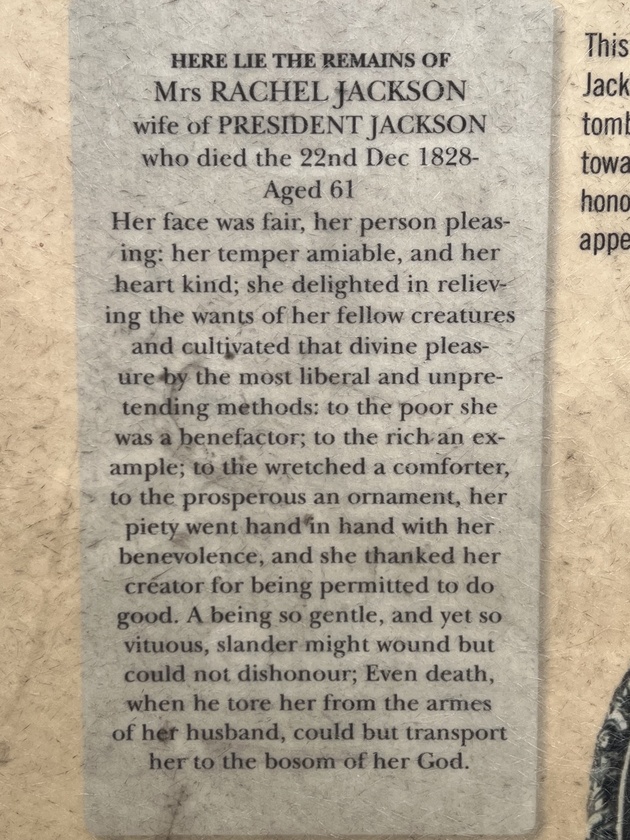Today, before taping The Huckabee Show, near Nashville, I visited The Hermitage, the country home of our seventh president, Andrew Jackson.
I was impressed by its austerity — though it also had somewhat pretentious Greek flourishes, which I found interesting for America’s first “populist” president.
Jackson, once a hero to Democrats, has become more controversial in recent years, such that the party dropped him from its pantheon of heroes (and Trump put his portrait in the Oval Office).
But whatever you think of Jackson as president, what I found most impresssive was his love for his wife, Rachel Donelson Jackson. She lived to see him elected, but died before he was inaugurated.
Jackson never overcame her loss. He wore a black band of mourning on his hat for the rest of his life, and never courted or married again. The epitaph on her grave, next to his in the family garden, is the most beautiful I have ever read.
I think that’s what makes a populist a populist — not a hatred of elites or a flair for incendiary rhetoric, but a deep capacity for love, starting with those closest to you, and then your community, and your country, all before the world in general.
This week’s portion launches the great story of Abraham, who is told to leave everything of his life behind — except his immediate family — and to leave for “the Land that I shall show you.”
There’s something interesting in the fact that Abraham is told to leave his father’s house, as if breaking away from his father’s life — but his father, in fact, began the journey, moving from Ur to Haran (in last week’s portion). His father set a positive example — why should Abraham leave him?
Some obvious answers suggest themselves — adulthood, needing to make one’s own choices, his father not going far enough, etc.
But I think there is another answer. Abraham (known for the moment as Abram) needs to establish his own household. This is not just about making one’s own choice, but really about choosing one’s own starting point. It’s starting over.
Sometimes we start over in fundamental ways even if much that surrounds us remains the same. Sometimes the journey we have to ...
The story of Noah is familiar; the details, less so.
Noah is often seen as an ambivalent figure. He was righteous -- but only for his generation. What was his deficiency?
One answer suggests itself: knowing that the world was about to be flooded, he built an Ark for the animals and for his own family -- but did not try to save anyone else or to convince them to repent and change their ways (the prophet Jonah, later, would share that reluctance).
Abraham, later, would set himself apart by arguing with God -- with the Lord Himself! -- against the destruction of Sodom and Gomorrah, saying that they should be saved if there were enough righteous people to be found (there were not).
Still, Noah was good enough -- and sometimes, that really is sufficient to save the world. We don't need heroes every time -- just ordinary decency.
Hi all -- as I noted last month, I'm going to be closing down my Locals page, at least for tips and subscriptions -- I may keep the page up and the posts as well, but I'm no longer going to be accepting any kind of payment.
Look for cancelation in the very near future. Thank you for your support!
















